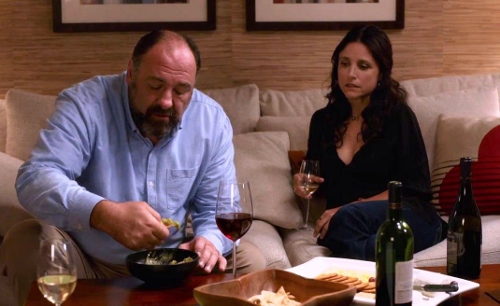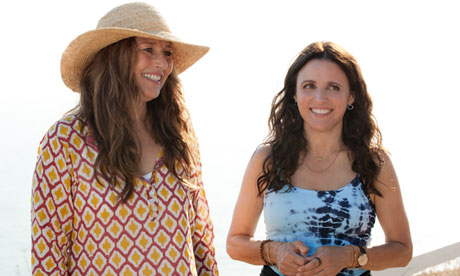Christine Campbell on The New Adventures of Old Christine was Elaine with a young son, a gay-straight brother and an ex-husband, co-running a gym with Wanda Sykes. Selina Meyer on Veep is Elaine with a college-age daughter, a gay-straight assistant (fellow Emmy winner Tony Hale) and an ex-husband, playing second banana to the President of the United States. And Eva in the indie romantic comedy that's currently racking up end-of-the-year critical plaudits and awards-season nominations, is Elaine with a daughter about to go off to college, an acquaintance who calls her "a dyke" and an ex-husband, dragging a heavy massage table up a long flight of stairs.
If you think about it while tilting your heard slightly to the left, Louis-Dreyfus is basically Jennifer Aniston with more facial expressions and even better hair. She's been called the new Mary Tyler Moore, but even MTM got to play seriously against type in Ordinary People. Watching Enough Said, I started to understand why Louis-Dreyfus never became a bigger movie star (coupled with her lack of trying). We already have Aniston. Is there room for another likable TV actress repeatedly repeating her signature role on the big screen?
After watching Enough Said, I also understood why Louis-Dreyfus has won four Emmys for three of her variations on a theme: Goddess is in the details, and although she's yet to prove herself as an actress with, say, Lisa Kudrow's remarkable range, she knows how to nail the details of situations and tiny moments. I've never seen a Julia Louis-Dreyfus reaction onscreen that didn't feel 100 percent authentic. Maybe she's not just playing Elaine Benes over and over; she could be playing herself, too, and I mean that as a compliment. Every little thing she does is magic, so natural and realistic, something an actual person in the same situation might actually do.
In Enough Said, she made Eva's emotional state in every position she found herself in -- the tentativeness of an awkward first date, the exasperation of reaching out to a daughter who's pulling away from you, the utter embarrassment of having your new BF and new BFF (the new BF's ex-wife) find out that you've knowingly been dating them both for weeks, unbeknownst to them -- seem incredibly real-life. I've never had my boyfriend find out that I've been collecting damaging intel on him from his ex, but I'm pretty sure my reaction would be similar to Eva's. She was like a cockroach under a spotlight, trapped between a roach motel and a can of Raid. I half expected her to flap her arms and try to fly away.
As for the other great female actresses in Enough Said, Catherine Keener can pretty much play smug and brittle in her sleep (though I'd much rather spend an afternoon antique-furniture shopping with her character in writer-director Nicole Holofcener's previous film, 2010's Please Give, than eating vegan food with Eva's hyper-critical new BFF, who reminded me of a cross between Dorothy's pretentious writer friend, Barbara Thorndike, on an old episode of The Golden Girls and Robert Barone's ex-wife on Everybody Loves Raymond), and it's great to hear Toni Collette - an actress who never plays the same character twice -- getting a chance to use her natural Australian accent as Eva's old BFF.
The casting of an Emmy-winning TV star (Louis-Dreyfus) and a twice-Oscar-nominated indie actress (Keener) was something of a genius movie in that it mirrored the dynamic between Eva and Marianne: a soccer mom who was so insecure (a Louis-Dreyfus character specialty) and so honored to be invited to the cool table by the sophisticated poet (and friend of Joni Mitchell!) that she ignored all of her glaring flaws while zeroing in on those of the hapless third angle of the unconventional love triangle.
The film's real revelation, though, as that third angle, was James Gandolfini. I never had the stomach to watch The Sopranos regularly, so I'm not overly familiar with the role that made him a multiple-Emmy-winning TV titan, but I did see enough of it to know that Albert was no Tony Soprano. Thanks to Gandolfini's tough-but-tender approach to the material, Albert stood out as the film's only truly sympathetic character, a man who refused to badmouth his ex (or tolerate their daughter doing it) even while said ex couldn't say anything nice about him. I probably would have gravitated toward him and fallen for him, much like Eva did, even if Gandolfini's death three months before the film's September release hadn't turned me into mush. It was tugging at my heartstrings the entire time.
Sadly, Gandolfini's death from a heart attack last June also made me look at Albert in a way that I might not have were the actor still alive. (Did Gandolfini look so unhealthy in The Sopranos?) The cracks about his weight and his eating habits probably wouldn't have seemed quite so nasty. There was even a "Fat Albert" quip! The bit about how he doesn't know how to whisper (which I totally understood, and kudos to Gandolfini for getting it, too, even though Albert didn't) and separating the onions from the guacamole wouldn't have come across as being so mean-spirited. "He's a nice guy, appreciate him," I wanted to shout at the movie screen.
That said, Gandolfini earned my sympathy on his own by not overplaying the pathos of the character. He made Albert not someone to be pitied - not when Eva didn't know whether she wanted to kiss him on the first date, not when she couldn't bring herself to perform with him in bed - but rather someone to be admired for being so true to his true self. The premise of the film underscored the idea that one woman's (or man's) junk is another one's treasure, an idea that was previously presented in an episode of Sex and the City (the one in which Charlotte had the party where the invitees had to bring a boyfriend they were ready to dump on someone else). That's the thing about love: It doesn't matter if everyone else loves the one you're with because opinions are like exes. Everybody has one. (Incidentally, speaking of Sex and the City, Carrie also once collected intel on Mr. Big from an ex, and with far more calculation, yet she emerged totally unscathed. Enough Said's premise, though, has more in common with the 2005 Meryl Streep-Uma Thurman film Prime.)
Though Keener's Marianne was the film's least likable character, her unrelenting criticism of Albert felt as valid as Eva's opposite take on him, and that was largely due to Gandolfini's portrayal. He didn't turn Gandolfini into a wussy pushover, instead making Albert a man who was aware of his flaws but still comfortable in his imperfect skin. That "I'm not sure" uttered by Eva at the end of their first date when Albert leaned in to kiss her was as painful to watch as it must have been to hear. I wanted to jump into the screen and kiss him myself, not because I felt sorry for him, but because Gandolfini's reaction, a mix of wounded pride, resignation and fortitude that set the balance of noble strength and delicate vulnerability that would mark the rest of his performance, was so tragi-sexy.
Although the film had well over an hour to go, I was actually a little surprised when Eva suddenly showed up at Albert's house for the second date. I wish the film had included a scene of him summoning the courage to ask her out again because I'd like to know how he went from that deflating "I'm not sure" moment to requesting a second date.
I'm glad he did, though. By the conclusion of Enough Said, I felt as one might feel after the break-up of a relationship that one doesn't want to end, not only because the movie was over but because after his next and final film (the 2014 crime-drama Animal Rescue), there'll be no more dates with Gandolfini.




No comments:
Post a Comment